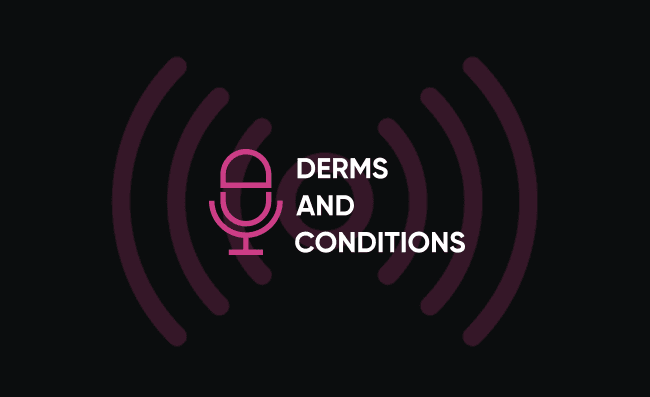Derms and Conditions Podcast Episode 59:
Improving Our Understanding of How Drugs Work: Clarifying Questions with Monoclonal Antibodies and JAK Inhibitors
Featuring Christopher Bunick, MD, PhD | Release Date: September 07, 2023
In Episode 59 of Derms and Conditions, our host, James Q. Del Rosso, DO, continues his conversation with Christopher Bunick, MD, PhD, an associate professor of dermatology at Yale University School of Medicine who performs specialized research on novel treatments and therapies. After discussing sarecycline for acne in part 1, the 2 switch gears to monoclonal antibodies (MAbs) and Janus kinase (JAK) inhibitors.
Dr Bunick begins by discussing dupilumab, an IL-4 and IL-13 blocker with significant clinical efficacy and a favorable safety profile in treating atopic dermatitis (AD). He states that in a network meta-analysis, upadacitinib and abrocitinib were shown to be more effective at treating AD than dupilumab, but dupilumab was shown to be more efficacious than tralokinumab and lebrikizumab. Both agree that despite the similarity of many of the MAbs on cursory review, especially with the capability to inhibit IL-13, each agent needs to be evaluated independently due to structural, pharmacologic, and pharmacodynamic differences. They noted case reports where tralokinumab was effective and well tolerated in treating patients with inadequate response or problematic conjunctivitis with dupilumab.
Next, they discuss IL-13 signaling in more detail, which is increased and more persistent in tissues compared to IL-4. However, Dr Bunick explains that IL-4 has more potent signaling, so IL-13 isn’t necessarily more clinically relevant. He notes that more research is required to further understand the structure-function mechanisms of cytokines within cells. He then mentions the noncanonical receptor, also called the decoy receptor, for IL-13, which may explain some differences in drugs that inhibit IL-13.
Dr Del Rosso then addresses a very important recent publication by Dr Bunick and colleagues that evaluated adverse effects of special interest (AESI) of conventional immunosuppressive drugs as compared to 2 oral JAK inhibitors, upadacitinib and abrocitinib, used for AD. While the study population that used conventional immunosuppressives addressed a patient population beyond AD affected by more comorbidities, Dr Bunick notes that the risk of AESI also exists for these agents and is not limited to only JAK inhibitors. Dr Del Rosso agreed that many risk factors can contribute to AEs and not all the focus should be placed on JAK inhibitors. Tune in to this episode to learn important details about understanding and using monoclonal antibodies and JAK inhibitors!
